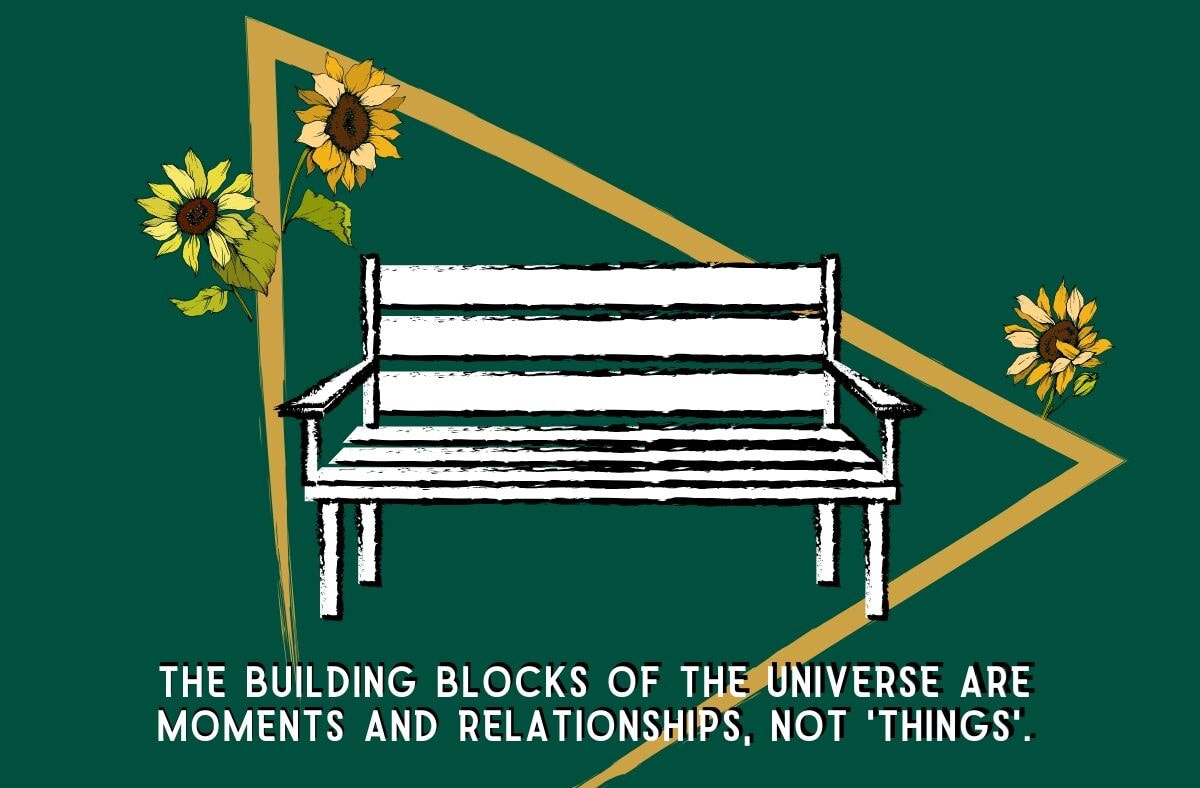- Home
- Process Worldview
- Community
- Art and Music
- Whitehead and Process Thinking
- Podcasts
- Spirituality
- Ecological Civilization
- Education
- Contact
- Social Justice
- Science
- Animals
- Sacred Poems
- Whitehead Videos
- Index of All Titles
- Practicing Process Thought
- Process Spirituality: A Spiritual Alphabet
- Recent Posts
When process-relational thinkers
say relational, what do they mean?
I think they mean that relationships are the building blocks of the universe and the spiritual web of our lives.
This does not mean that everything is good or happy, constructive or peaceful. Relationships can be painful and fraught with tragedy. People can be enriched by relationships but also suffocated by them. Our relationships with one another can be entangled forms of injustice rather than joy, and our relationships with the more than human world, other animals and the earth itself, can likewise be tragic. But relationships are inescapable and are indeed, at their best, the spiritual web of our lives.
I borrow the phrase spiritual web of our lives from Frederic and Mary Ann Brussat of Spirituality and Practice. They do not think of themselves as process-relational thinkers, and yet their short essay below captures the spirit of process-relational thinking better than so many process thinkers. To their words I add an ontological addendum pointing to the idea that, for process thinkers, relationships are felt relations or prehensions. My hope offers at least the beginning of an answer to the question: When process-relational thinkers say relational, what do they really mean?
Jay McDaniel. June 25, 2020
Relationships as the
Spiritual Web of our Lives
Frederic and Mary Ann Brussat
Relationships are the spiritual web of our lives. The crucial strands of family, intimate relationships, marriage, friends, community, nature, and place and the wider world.
The quality of our spiritual lives is measured by these essential bonds. Indeed, our relationship with God is reflected and expressed in these and other relationships.
They are the essential meaning and miracle in our days. They are the arena in which we exercise our values and express our visions.
Relationships enrich our lives with intimacy, purpose, healing, and wholeness. They also draw out our fear, anger, envy, hatred, pain, greed, and shame. Through inner work, we can befriend the shadow, face death, and renew our spirits.
As we explore our relationships and the feelings that come with them, we find that they are hitched to everything else in the world. We are parts of the whole and obligated to love both the familiar and the mysterious, often fearsome “other.”
Although terrible and divisive forces may eat away at our relationships, the spiritual web can never be destroyed. The Spirit sustains us as we patch and reweave the web again and again.
Finally, relationships are our training ground. “Being human is an accomplishment like playing an instrument.” Michael Ignatieff once observed. “It takes practice.” Through our connections with the whole and the holy, we learn how to be fully human.
The quality of our spiritual lives is measured by these essential bonds. Indeed, our relationship with God is reflected and expressed in these and other relationships.
They are the essential meaning and miracle in our days. They are the arena in which we exercise our values and express our visions.
Relationships enrich our lives with intimacy, purpose, healing, and wholeness. They also draw out our fear, anger, envy, hatred, pain, greed, and shame. Through inner work, we can befriend the shadow, face death, and renew our spirits.
As we explore our relationships and the feelings that come with them, we find that they are hitched to everything else in the world. We are parts of the whole and obligated to love both the familiar and the mysterious, often fearsome “other.”
Although terrible and divisive forces may eat away at our relationships, the spiritual web can never be destroyed. The Spirit sustains us as we patch and reweave the web again and again.
Finally, relationships are our training ground. “Being human is an accomplishment like playing an instrument.” Michael Ignatieff once observed. “It takes practice.” Through our connections with the whole and the holy, we learn how to be fully human.
The Art of Making Connections
Separateness is an illusion. That's what we learn through the spiritual practice of connections. Everything is interrelated — in time, space, and our very being. Both religion and science reveal this truth — Hinduism's image of Indra's net, Buddhism's understanding of interbeing, the experiences of the mystics, the teachings of ecology and physics, even the Internet.
One definition of spirituality is "the art of making connections." There are certain givens: The one is made up of many. One thing always leads to another. Everything is related to everything else. You practice connections, then, by consciously tracing the links connecting you with other beings. Any point is a good starting place — your family line, your work, your back yard. Watch for the moments when the separations disappear. And don't be shy about naming mystical experiences as such when you experience them.
Frederic and Mary Ann Brussat Spirituality and Practice
One definition of spirituality is "the art of making connections." There are certain givens: The one is made up of many. One thing always leads to another. Everything is related to everything else. You practice connections, then, by consciously tracing the links connecting you with other beings. Any point is a good starting place — your family line, your work, your back yard. Watch for the moments when the separations disappear. And don't be shy about naming mystical experiences as such when you experience them.
Frederic and Mary Ann Brussat Spirituality and Practice
Relationships as Felt Connections
an ontology of relationality
What can it mean to say that relationships are the building blocks of the universe?
Normally we think of a building block as existing, with its own shape and identity and then entering into relationship with other things. From a process perspective the obverse is true. The true building blocks of the universe are momentary happenings: moments of experience, which, in the depths of an atom, we might call energy-events. These events are not self-contained. They come into existence through their relationships with other events.
The solid things of the world - individual blocks of concrete, for example -- are aggregate expressions of momentary happenings, energy-events, these moments of experience. The idea of inert matter is an illusion. Beneath and behind the appearance of seemingly lifeless matter is the vibrant activity of pulsation, of energy, of vibration, or process, of energy-events interacting with one another.
There is a logical way to put this. It is to say relationships are internal to the moments of experience, not external. An internal relation is a relations that is part of the real internal constitution, the essence, of the entity at issue. An external relation is a relationship that is not part of the entity at issue. From a perspective, the true building blocks of the universe, the momentary events, emerge out of internal relations with their past actual worlds. These internal relations are not simply abstract ideas. They are feelings. They are subjective acts of taking into account the past, often in a bodily way and always in a psychological way, from a specific region in time and space. Whitehead's word for feeling is prehension. Relationships, then, are prehensions.
The most intimate example of this is our own human experience. We ourselves emerge out of our feeling of other people, earth and sky, plants and animals, the ideas in our minds, the hopes in our hearts. These felt relations may be happy or sad, pleasurable or painful, positive or negative, energetic or draining, conscious or unconscious' in any case they are felt relations and we would not exist without them. And they, along with we ourselves, are changing moment to moment. Our feelings are in process and we are, too.
Think of the Christian idea that God is a holy trinity: three persons in one, existing in relation to one another. Or the Buddhist idea that the beings of the world are inter-beings because they depend on one another for their very existence. Process thinkers say something similar. They say that every entity is trinitarian in its way; that every being is an act of inter-being or inter-becoming. The Brussats have it right, Relationships are the web of our lives. The building blocks of the universe are moments and relationships, not things.
- Jay McDaniel, 6/25/2020
The Harvard Study of Adult Development
Good genes are nice, but joy is better,
"Close relationships, more than money or fame, are what keep people happy throughout their lives, the study revealed. Those ties protect people from life’s discontents, help to delay mental and physical decline, and are better predictors of long and happy lives than social class, IQ, or even genes. That finding proved true across the board among both the Harvard men and the inner-city participants,"


